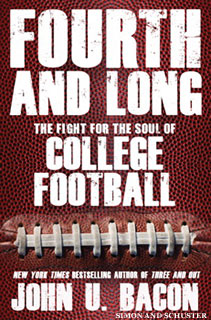Mens sana in corpore sano.
Sound mind, sound body. A simple philosophy, which means exercise is good for the brain. What was revolutionary a century ago is common sense today. It's also the best reason to support school sports, which Americans believe in more than any other culture in the world.
In the late 1800s, when the Wolverines were just getting started, Michigan president James B. Angell hated big-time football, and just about everything that went with it: The coaches, the crowds, the media and the money. But the one argument Angell couldn't counter was "Sound mind, sound body." On that basis, he allowed the Wolverines to play. It's still a good reason, of course, so good Americans have expanded it to include women, thanks to Title IX.
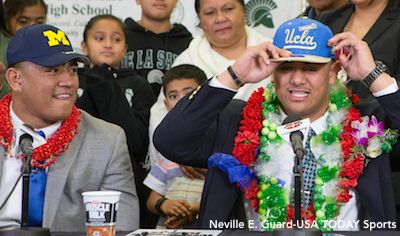
True, the massive money big-time football and basketball programs now generate can easily eclipse the original motives for starting college sports. But for the vast majority of college athletes, that's why you play. A close second is the chance to go to college, something a lot of these athletes wouldn't have, if not for sports.
Blue-chip recruits are going to get plenty of attention from the best coaches, no matter what the NCAA's latest rules are. But if you're an average player, you probably can't afford to make trips to every school that might be interested in you, and those programs can't afford to find you, either. This is why satellite camps were designed to bring all the region's players and coaches together for a day or two, creating a convenient, cheap and massive match-making service.
Obviously, the teams that conduct satellite camps are trying to get the best players to play for them. It's kind of the point, just like admissions departments have been sending their representatives to high schools across the nation for decades to drum up interest, and find the best students.
Critics of satellite camps whisper this as if it's sinister, like they're uncovering a dark secret. Their critique carries about the same moral weight as accusing an admissions officer of trying to attract better students by meeting them. The horrors! Won't somebody think of the children?!
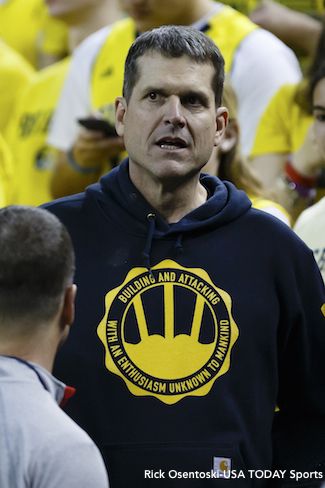
If Michigan coach Jim Harbaugh, the most visible proponent of satellite camps, was trying to hide his goal of getting good players, perhaps he shouldn't have invited reporters and the NCAA to watch. And if recruiting is a sin, the folks at the NCAA should be prepared to write a few more rules -- though perhaps we shouldn't tempt them.
But, with or without the satellite camps, programs like Michigan and Ohio State will get a lot of top players anyway. Last year, Harbaugh's "Summer Swarm" of nine camps drew 6,500 players, of whom only a handful signed with Michigan. The people who really benefit from satellite camps are the mid-major, Division II and III schools in the area, and the players they're recruiting.
One of the leading camps, literally called, "Sound Mind, Sound Body," started in Detroit 12 years ago. It hosted hundreds of mostly underprivileged high school players, many of whom received their first pair of cleats from the camp. They also worked out for a dozen or so college coaches, from Grand Valley State to Kent State, and learned life skills they'll need in the classroom and beyond. In other words, when they called it Sound Mind, Sound Body, they actually meant it.
This summer, Sound Mind, Sound Body scheduled camps in six cities, from LA to DC. But after Harbaugh took his show on the road last year, the coaches down South didn't take too kindly to it. The Southeastern Conference has won eight of the past ten national titles, and its schools have had a monopoly on their talent-rich states. They don't need a carpetbagger from the North coming down to mess with a good thing -- even if that means limiting the options for the players themselves. Actually, limiting players' options is not a byproduct of the Southern Strategy. It's the whole point.
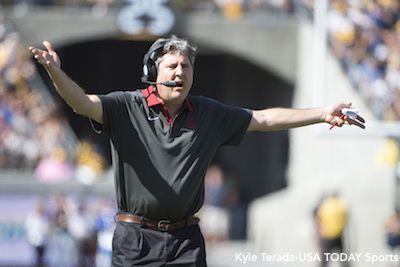
So the SEC voted for an NCAA proposal to ban satellite camps, and the ACC joined in, which was no surprise. But it came as a shock to many of the coaches when their conference representatives at the Pac-12 and Big 12 voted for the ban, too, which seems to run counter to their self-interest, not to mention the recruits'.
On Monday, Washington State's Mike Leach told Sirius XM College Sports he believed all Pac-12 teams but UCLA and Stanford were against the ban, but the conference voted for it anyway. "I can't fathom how it's possible we voted to eliminate it," he said. "Whether it's smart, dumb or in the middle, it's wrong. It's wrong. If we're even remotely close to what we say we are, that needs to be overturned immediately."
A few days later, Leach, who earned a law degree from Pepperdine, texted the Seattle Times with more: "The mission of universities and athletic programs should be to provide future student-athletes with exposure to opportunities, not to limit them. It appears to me that some universities and conferences are willing to sacrifice the interests of potential student-athletes for no better reasons than to selfishly monopolize their recruiting bases.
"I will be fascinated to hear any legitimate reasoning behind this ruling."
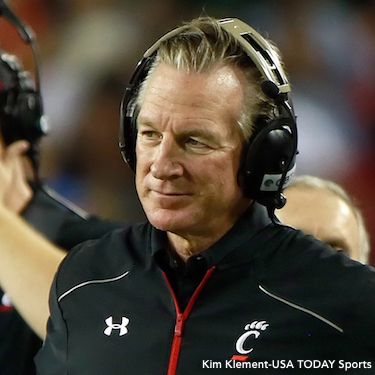
Leach is still waiting. With the Pac-12 and Big 12 voting for the ban, the morally challenged NCAA ended satellite camps, because of -- well, just because. It didn't dare give a reason.
Tommy Tuberville has coached Ole Miss, Auburn and Texas Tech before taking his current post at Cincinnati. On Tuesday night, he told ESPN, "I think you'd have a small amount of coaches in some of the Power Five conferences say, ‘Let's don't have them,' but there's more than just the Power Five here that's being affected. You've got all the smaller conferences, [and] you have the thousands of student-athletes that are really being cheated out of the opportunity to be evaluated by more college coaches.
"I just can't imagine, of all the rules in my 35 years of coaching college football, that this was even voted on, because it just doesn't make any sense for the players. Surely we've got more sense than this."
You'd think so -- unless you'd actually studied the modern history of the NCAA. As of this week, the NCAA allows off-season satellite camps in every sport but football. It is an organization that no longer adheres to any principle more substantial than the direction the wind blows -- except perhaps self-preservation, which matters here because the NCAA is terrified of the SEC splitting off, and taking the ACC and other Power Five conferences with it.
What the NCAA is not concerned about it is rampant cheating among some of its most prominent members -- arguably the worst kept secret in college sports. For my previous book, Fourth and Long: The Fight for the Soul of College Football, I spent almost every Wednesday night during the 2012 season talking with Louisiana native-turned-Penn State star Mike Mauti. He had turned down illegal offers from several Southern schools before accepting Penn State's offer of a scholarship, an education and an opportunity -- nothing more.
"I know for a fact there are players getting paid [at other schools]," Mauti told me. "Guys I know are getting tens of thousands of dollars a year. They give you credit cards until they run out. There's a lot of money involved. One hundred thousand dollars? Over the course of five years? Easily.
"I was offered money. They don't come out and say they're gonna give you this money. Players at other schools, they know the way things work. It's a different culture at other places. They go through the churches, and the [car] dealerships, and the good old hundred-dollar handshakes." They've since added jobs in town, not the campus, for the parents, and poker chips, which can't be traced.
Like most college football players, Mauti noticed the NCAA's leaders seem entirely unable, unwilling, or both, to pursue the stories those of us inside the industry hear constantly. They rarely act on such rumors until local reporters, working with a tiny fraction of the NCAA's resources, do the job for them, and shame the NCAA enforcers into action. This familiar cycle does little to bolster our faith in the enterprise.
"They're not serious," Mauti said. "If you really wanted to discipline the teams that are doing the cheating, if they really wanted to cut out the corruption, they'd do their investigations and punish the schools that do that. It can't be that hard. Everyone knows who they are.
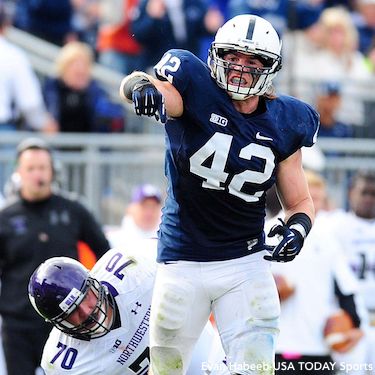
"But they have to want to go after the cheaters. It's not up to the public to determine that -- it's for them. Otherwise, what is the NCAA for? What do they do?"
They adjudicate on breakfast bagel condiments, enforce limits for stretching down to the minute and ban satellite camps, which will be felt most by the underprivileged, mid-level players -- the very people the NCAA claims to be defending, protecting and promoting in endless self-congratulatory ads that run throughout its biggest money grab of the year, March Madness.
Sound Mind, Sound Body, is not only the name of the do-gooder camp the NCAA just banned, but the foundation on which the NCAA was built back in 1905.
Sound mind, sound body?
Good idea. The NCAA should try it.
-- John U. Bacon is the author of four New York Times bestsellers. His latest book, Endzone: The Rise, Fall and Return of Michigan Football was published in September. He gives weekly commentary on Michigan Radio, teaches at the University of Michigan and Northwestern's Medill School of Journalism, and speaks nationwide on leadership and diversity. Learn more at JohnUBacon.com, and follow him on Twitter @johnubacon.


